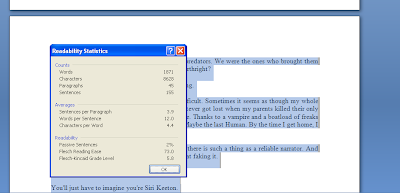Harder=Better
One of my favorite books of all time, one that I am rereading lately is Blindsight by Peter Watts. Now this book demands more than cursory knowledge in a great number of disciplines and it's a far cry from the dumbed down dragon-bloated shit you'll find one or two shelves over at your local book store.
Without pretty extensive reading and a long history of reading about physics, technology, biology, psychology and science in general it would be damn near impossible to get much out of this book. Ironically the strong appeal for me is a strong turn off for the overly bland literary palettes of my contemporaries and countrymena.
Therefore it gave me great pleasure to stumble across a feature built into MS Office 2007. If you check a certain box and then do a spelling/grammar check it gives you the reading level for the piece in question. What fun, I thought. Surely this work would register off the chart.
Right?
Check it out. I broke the book down into it's 4 sections and include a screenshot of the relevant stats and their respective reading levels. I'll do a summary at the end.
The prologue is the shortest section and you can't imagine my surprise at the result.
This book that pushed my mental boundaries and reignited my passion for the weird arcana that dwells within the mind of my dear P.W. starts out at only a 4.7 reading level. That means a 9 or ten year old should be able to cope with it easily, right?
 Now the first section 'Theseus' is many times longer and begins to delve into the rampant psychoses of the world. Staggeringly it only rates at a 5.6 reading level. Hmmm.
Now the first section 'Theseus' is many times longer and begins to delve into the rampant psychoses of the world. Staggeringly it only rates at a 5.6 reading level. Hmmm. Rorschach, aka section 3, deals with most of the heavy ass shit that makes the story so utterly kick ass. Most of the big questions (those with answers get them here) peel back like long picked blisters. To my utter dismay this section doesn't even rate 5th grade reading.
Rorschach, aka section 3, deals with most of the heavy ass shit that makes the story so utterly kick ass. Most of the big questions (those with answers get them here) peel back like long picked blisters. To my utter dismay this section doesn't even rate 5th grade reading. Finally, at only about 300 words more than the prologue we end with Charybdis. This finally ratchets the score up a notch but only to a meager 5.8.
Finally, at only about 300 words more than the prologue we end with Charybdis. This finally ratchets the score up a notch but only to a meager 5.8.
What does this tell us? Oh let's see...ummm...oh yeah. The criteria are fucked all to hell if this is the result we are getting.
I need to find some better means of literary analysis (like say, using my own brain) or at least score something with more refined parameters to work with. When I get some better tools I will be sure to revisit this work and provide a better report. Something that looks at the type, scope and uniqueness of words and not just the size of words/paragraphs.
No comments:
Post a Comment